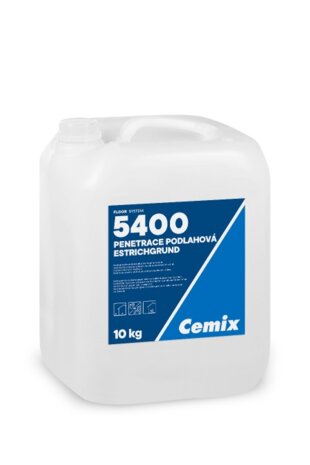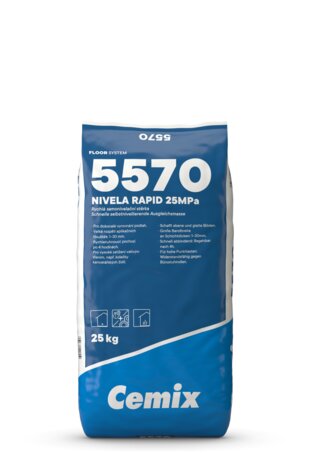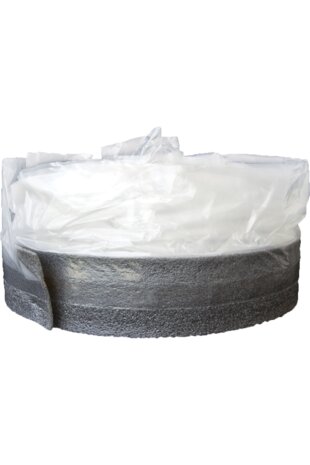|
5290
ANHYDRITE SCREED 25MPa
Formerly 090
Hassle free screed laying
Self-leveling screed properly processed makes leveling compound unnecessary.
- Calcium sulfate screed for creating floating and bonded indoor screeds.
- Self-levelling: easy to use.
- Shrinking- and crack-free.
- High thermal conductivity: particularly well suited for underfloor heating systems, without using additional reinforcement.
- For application thicknesses over 35 mm to be covered with tiles, parquet, laminates, PVC, carpets, etc.
- 25MPa: For moderately loaded areas in residential and office premises
Area of application
- Indoor: floor
Heating and cooling area
- Floor
Processing method
- For hand and machine processing
- For the construction of floors with or without underfloor heating with high load requirements in the interior (in the construction of apartments, offices, administrative buildings, hotels, schools, etc.).
- Creation of floating and combined (connected) screeds for laying floor coverings (tiles, parquet, floating floors, PVC, carpets, etc.).
RECOMMENDED SYSTEM PRODUCTS
Processing details
Learn more about technical details for processing this product.
Substrate requirement
The substrate must comply with the applicable standards, must be solid, free of loose particles, free of dust, paint, residues of demoulding substances and efflorescence. It must be sufficiently rough, dry and evenly absorbent. The surface shall not be frozen or water-repellent. The substrate must be stable in volume.
Substrate preparation
A bonded layer: Before applying the screed to the old concrete, the substrate must be moistened and treated with Cemix primer 5400.
Floating layer: Separate the substrate with a suitable separation layer e.g. PE 0.2mm. Thermal and acoustic insulators must be stacked together without gaps. Working or structural joints must be respected and must be created perimeter dilatation of vertical building elements (walls, pillars, pipes, etc.). The substrate must comply with the applicable regulations, standards or recommendations of the material manufacturer.
Preparation of the mixture
Pour the dry mixture into the prescribed amount of water and mix with a slow-speed mixer. Stir to a homogeneous mixture without lumps and leave to rest. Then mix again briefly. Use suitable machinery, e.g. SMP FE 100, for machine processing.
Water demand

| Quantity | Liters (Min) | Liters (Max) |
|---|---|---|
| 25 kg | 3.7 L | 4.3 L |
| 1 kg | 0.15 L | 0.17 L |
Mixing


Processing instructions
Before application, check the spread rate using the Hägermann-Trichter method, which should be 230-250 mm. Pour the mixed mixture in a single layer to the desired height. Afterwards level and aerate using vibrating lats. In narrow profiles (e.g. door between rooms) or in rooms where the aspect ratio is greater than 1 : 3, expansion joints must be made. If a very smooth surface is required (under cork, PVC, etc.), sand and re-grout the floor with a fine self-levelling trowel 1-3 mm thick.
Application thickness

| Minimum layer thickness | 15 mm |
|---|---|
| Recommended layer thickness | 45 mm |
| Maximum layer thickness | 100 mm |
Consumption

Yield
| Material consumption | at | unit | Yield |
|---|---|---|---|
| 25 kg | 35 | MM | 0.4 |
| 1,000 kg | 35 | MM | 19.9 |
Working time (potlife)

60 min
Walkability after

24 h
Treatment after application
Avoid the negative effects of sun, heat, humidity and draughts. Protect from frost and rain. Direct heating of the surface is prohibited. Keep the screed in a moist condition for 2-3 days.
Tool and cleaning instructions
Wash off tools with water immediately after finishing work. Clean dried residues mechanically.
References
Technical parameters
| Main binder | Gypsum |
| Flammability class | A1fl |
| Max. grain size | 4mm |
| Full load after | 7 d |
| Compressive strength 28 days in N/mm² | 25 N/mm² |
| Flexural strength 28 days in N/mm² | 6 N/mm² |
| Thermal conductivity λ in W/(m.K) | 1.25 |
| Dry bulk density in Kg/m³ | 1900 |
| Dry bulk density in Kg/m³ to | 2200 |
| Wet density in Kg/m³ from | 1900 |
| Release of corrosive substances | CA |
Download
|
|











